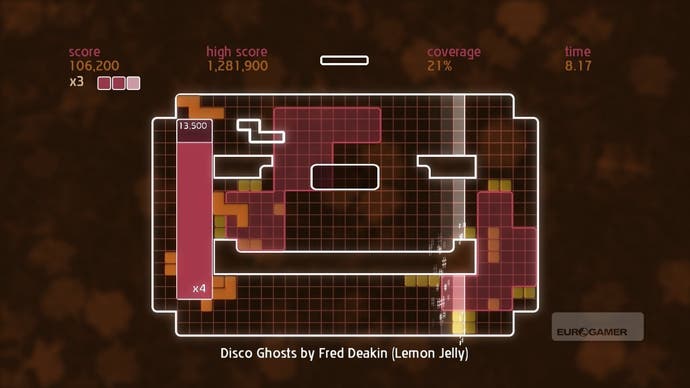Chime
Definitely Moby.
It's a quirk of puzzle games that you tend to define them by what they aren't. So Chime has chunky, malformed playing pieces that look - at a first glance at least - rather familiar, but it isn't Tetris. It has a sweeping timeline and holds music close to its beating heart, but it isn't Lumines either.
There's a little of both swimming around in its genome, inevitably, but, despite that Chime manages to feel genuinely new. And that's because of the other, most important thing that it isn't. It isn't one of those block games where you're trying to clear the screen. In Chime, you're trying to fill it up.
Zoë Mode's latest plonks you into a world of wafting melodies and shimmering neons, presenting you with a spacious play area onto which you stick a variety of five-block tiles.
All the shapes are initially rather awkward to get to grips with (probably because that extra square they're made from muddles with a lifetime of experience with Alexei Pajitnov's classic) and each new level throws in a few new arrangements, while steadily messing with the shape of the game's arena, placing a shifting series of obstacles for you to work around.
The objective is simple enough: place your tiles so they fit together creating solid oblong blocks of colour, called Quads. Quads will earn you points, and are translated into Coverage, which means they stay on the playing field permanently and contribute to your overall completion metre.
Meanwhile, the fragments of tiles which didn't get used in Quads will stick around for a little bit, giving you a chance to build on them, before eventually vanishing.
Still with me? Like the scoring blocks in Lumines, Quads have an active period during which you can grow them outwards for extra points. Equally, once they have become Coverage - and this takes a little getting used to - you can actually build over them anyway, searching for the little ragged gaps left in the playing area, and closing them up with new Quads.

Oh yes, and as each level is based around a piece of music, placing tiles causes notes to play as the timeline passes by, while Quads themselves will trigger samples. Essentially blending the puzzle game with a kind of explorative audio sequencer, it all adds to the overall sense of creation Chime is so good at capturing.
In case you hadn't noticed, this is one of those games, like Space Giraffe with its Bull Runs and Flower-Trimming, that's so thick with it's own bizarre terminology that it's hard to discuss how it works without sounding like an idiot or getting thoroughly confused. Thankfully, as with Jeff Minter's misunderstood classic, it's a lot easier to actually play Chime than it is to explain it - and that's partly, at least, because the whole thing is relatively unadorned.
Perhaps because of strictures imposed by the unique circumstances of the game's creation - as part of the OneBigGame initiative, almost all of Chime's proceeds will go to charity - or maybe just due to the sheer amount of information the player has to take into account, Zoë Mode's puzzler doesn't believe that a game that plays with sound must also mess about with trippy visuals, too.
While the various tracks warp and evolve as you place your tiles, the presentation remains fairly subdued. You could argue that the game is slightly lacking in character at times, but the charm of Chime lurks beneath the surface, as a kind of pressurised and very organic jigsaw puzzle - and there's a real pleasure to be had as you learn how its pieces best fit together.
And then there's the music. Ranging from work by Moby to Fred Deakin of Lemon Jelly, every one of Chime's handful of tracks provides a level with its own peculiar spark. It's entirely subjective, of course, but Paul Hartnoll's entry, For Silence, seemed the best fit for me, its abstract wailings eventually giving shape to a nice looping melody as the board fills up.

Philip Glass' Brazil, as ever, made me feel that somewhere, just out of view, a BMW was cruising along a curving mountain road while a deep voice discussed improved brake-pad performance and GPS as standard in all models.
Ultimately, there's not a great deal to master with Chime - the best tricks for growing Quads are fairly easy to pick up, and you should be able to nudge coverage of each of the game's five levels up to the 100 per cent mark within half a dozen attempts.
But this is about exploration more than progress, and once the thrill of getting to grips with the mechanics has died down, the appeal of Free mode, with its absence of scores or time limits, kicks in, turning the whole experience into a sound toy as much as a puzzler.
A lack of depth doesn't stop Chime from quietly turning its own genre on its head either. Zoë Mode's game shows what can happen when you give up destruction in favour of creation, and exchange tension for a kind of dreamy calm.
In other words, a lot worse has been done in the name of charity.


